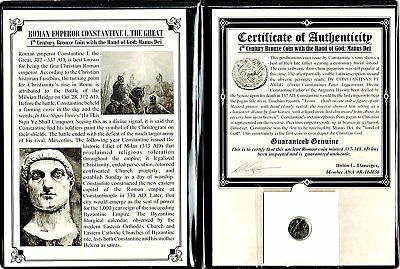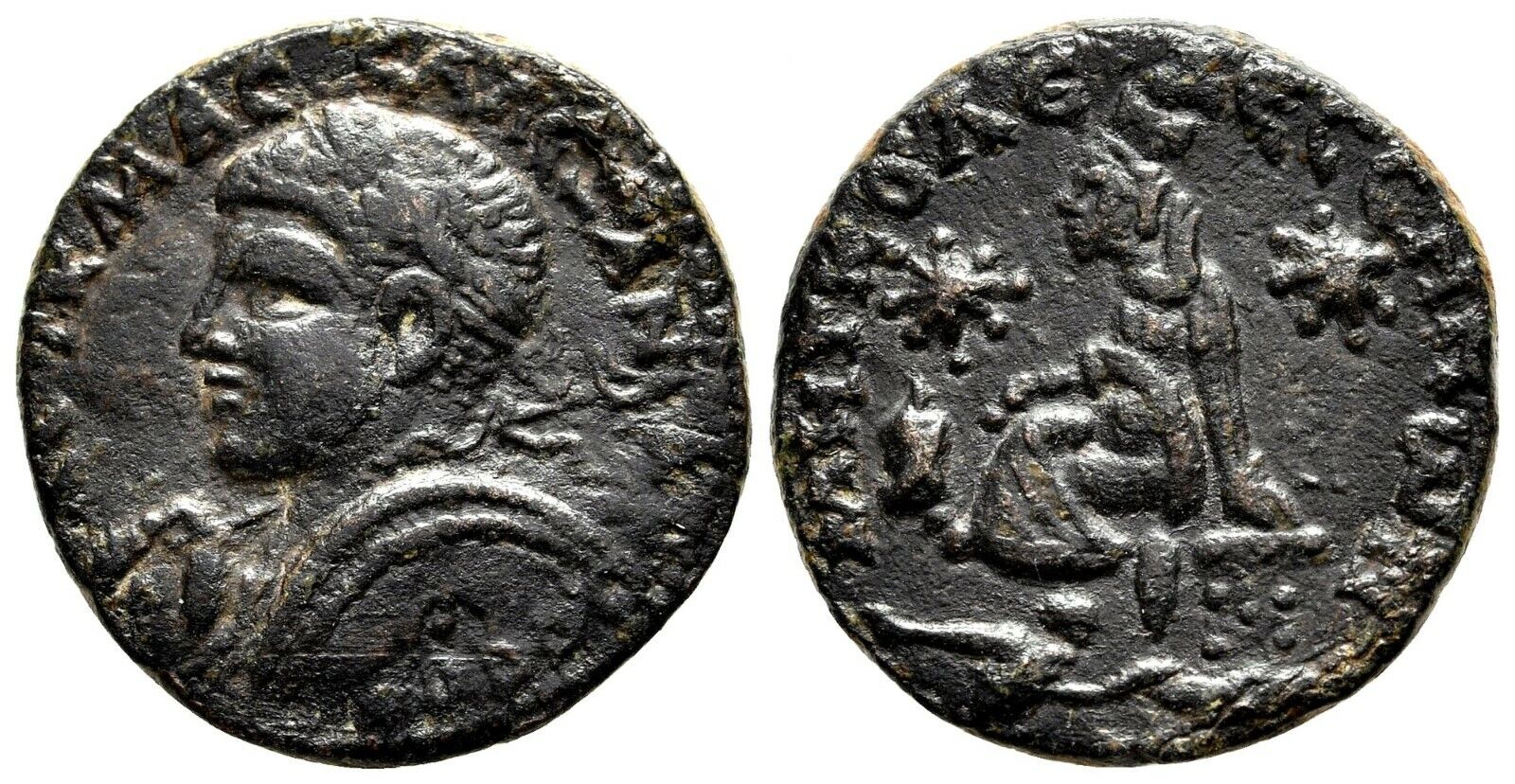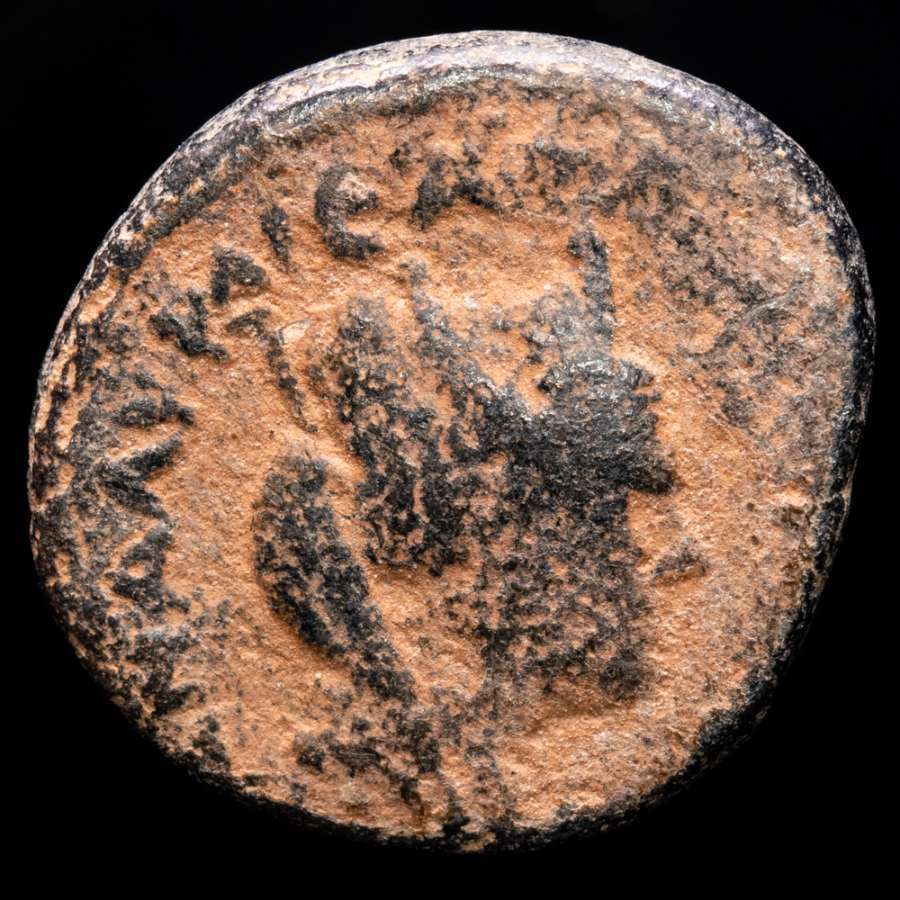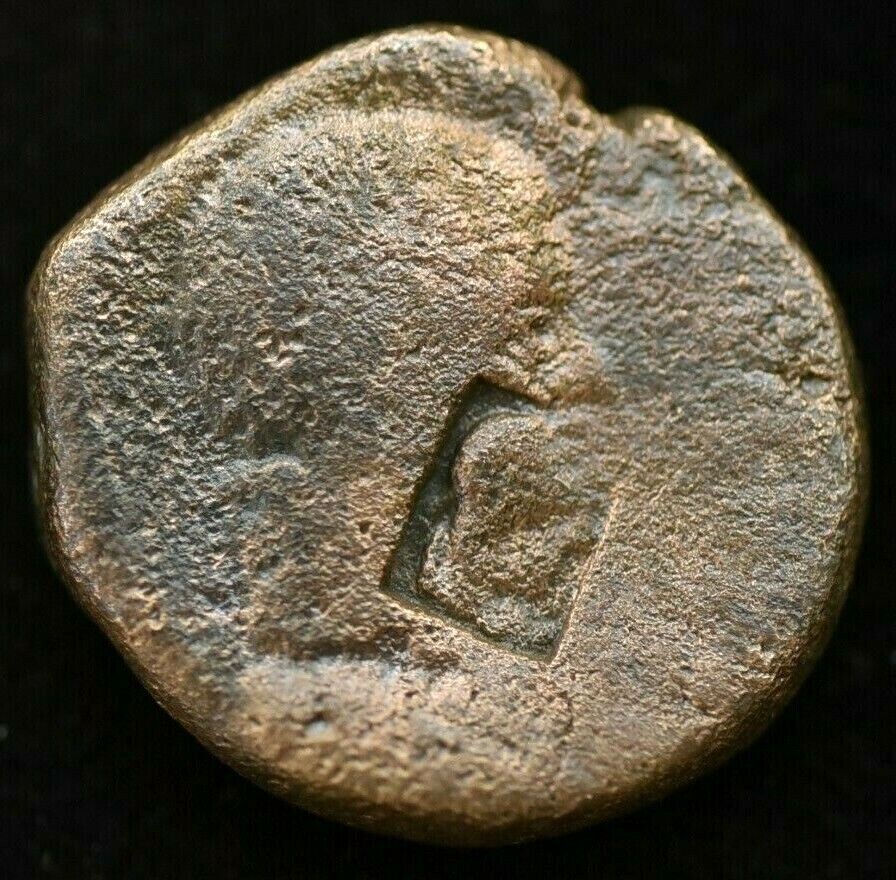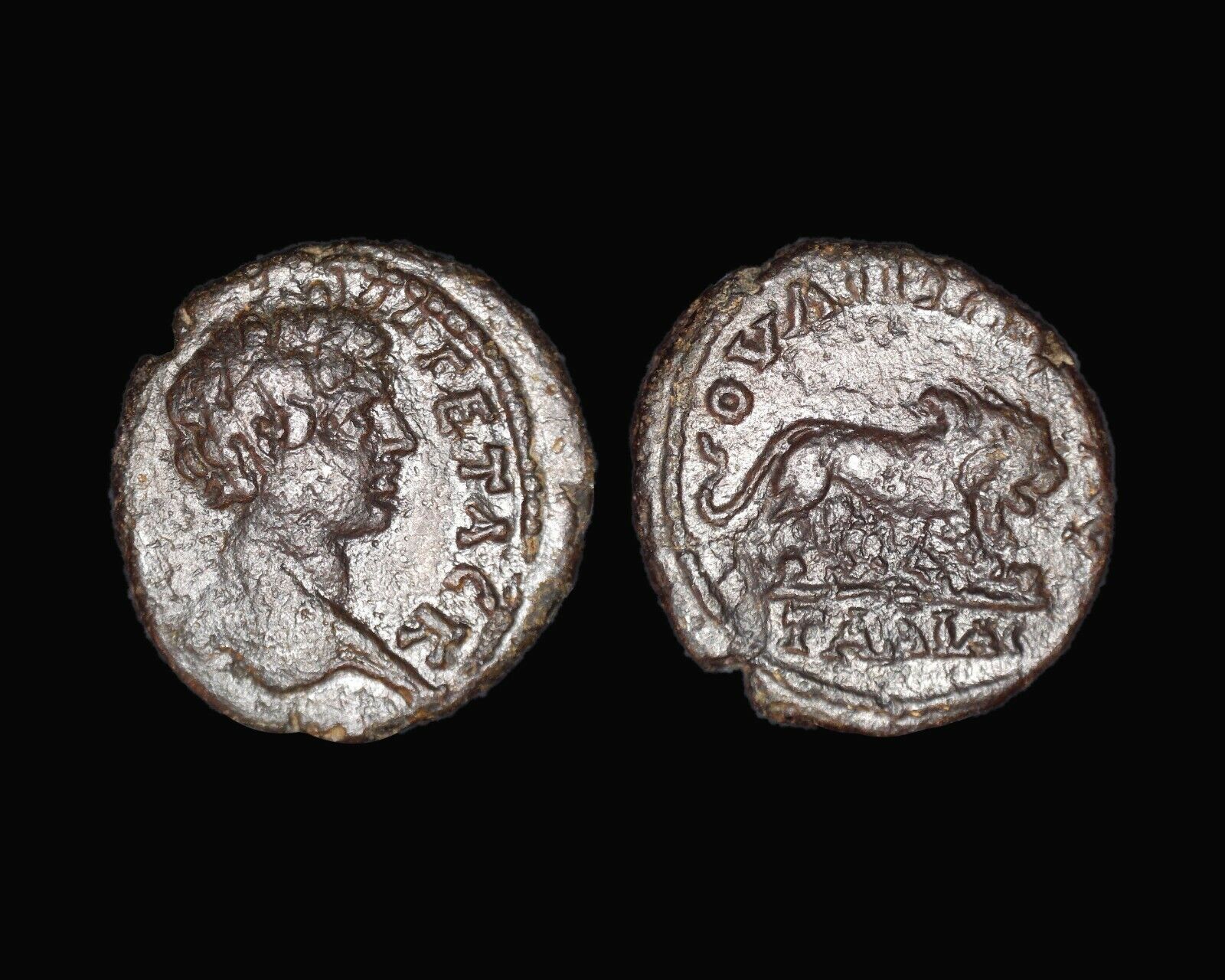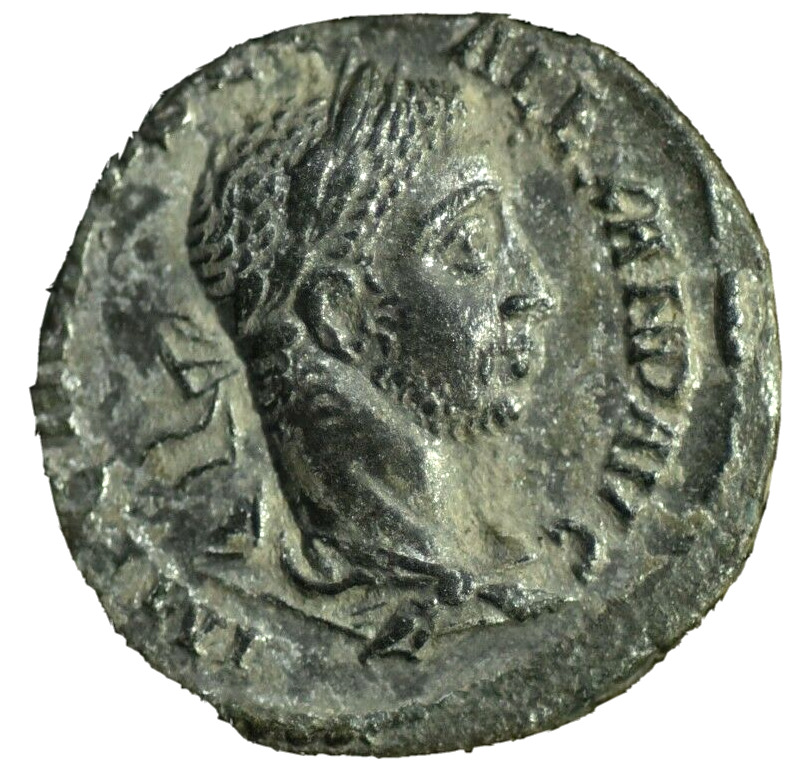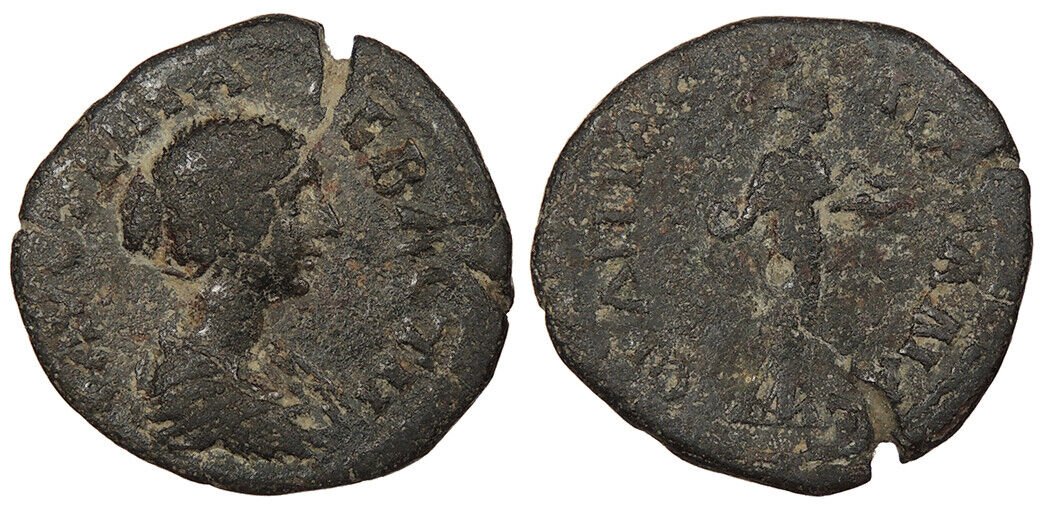-40%
SEPTIMIUS SEVERUS 193AD Philippopolis Thrace Eagle Ancient Roman Coin i57526
$ 89.76
- Description
- Size Guide
Description
Item:i57526
Authentic Ancient Coin of:
Septimius Severus - Roman Emperor: 193-211 A.D. -
Bronze 22mm (7.61 grams) of
Philippopolis in Thrace
<="" font="" face="Times New Roman"> AV◦K◦Λ◦C◦ CЄVHPOC Π, Laureate head right.
="">
ΦΙΛΙΠΠΟΠΟΛΕΙΤΩΝ,
<="" font="" face="Times New Roman"> Eagle standing facing on thunderbolt with open wings, head right, with wreath in beak.
You are bidding on the exact item pictured, provided with a Certificate of Authenticity and Lifetime Guarantee of Authenticity.
Jupiter is usually thought to have originated as a sky god. His identifying implement is the
thunderbolt
, and his primary sacred animal is the
eagle
, which held precedence over other birds in the taking of
auspices
and became one of the most
common symbols of the
Roman army
(see
Aquila
). The two emblems were often combined to represent the god in the form of an eagle holding in its claws a thunderbolt, frequently seen on Greek and Roman coins. As the sky-god, he was a divine witness to oaths, the sacred trust on which justice and good government depend. Many of his functions were focused on the
Capitoline
("Capitol Hill"), where the
citadel
was located. He was the chief deity of the
early Capitoline Triad
with
Mars
and
Quirinus
. In the
later Capitoline Triad
, he was the central guardian of the state with
Juno
and
Minerva
. His sacred tree was the oak. The Romans regarded Jupiter as the
equivalent
of the Greek
Zeus
, and in
Latin literature
and
Roman art
, the myths and iconography of Zeus are adapted under the name
Iuppiter
.
An
aquila
, or
eagle
, was a prominent symbol used in
ancient Rome
, especially as the
standard
of a
Roman legion
. A
legionary
known as an
aquilifer
, or eagle-bearer, carried this standard. Each legion carried one eagle. The eagle was extremely important to the Roman military, beyond merely being a symbol of a legion. A lost standard was considered an extremely grave occurrence, and the Roman military often went to great lengths to both protect a standard and to recover it if lost; for example, see the aftermath of the
Battle of the Teutoburg Forest
, where the Romans spent decades attempting to recover the lost standards of three legions.
Plovdiv
(
Bulgarian
:
Пловдив
) is
the second-largest city
in
Bulgaria
with a population of 380,683. Plovdiv's history spans some 6,000 years, with traces of a Neolithic settlement dating to roughly 4000 BC. It is the administrative center of
Plovdiv Province
in southern Bulgaria and three municipalities (Plovdiv,
Maritsa
and
Rodopi
) and Bulgaria's
Yuzhen tsentralen
planning region (NUTS II), as well as the largest and most important city in
Northern Thrace
and the wider international historical region of
Thrace
. The city is an important economic, transport, cultural and educational center.
Known in the West for most of its history by the
Greek
name
Philippopolis
, it was originally a
Thracian
settlement before becoming a major
Roman
city. In the Middle Ages, it retained its strategic regional importance, changing hands between the
Byzantine
and
Bulgarian Empires
. It came under
Ottoman
rule in the 14th century. In 1878, Plovdiv was made the capital of the autonomous Ottoman region of
Eastern Rumelia
; in 1885, it became part of Bulgaria with the
unification
of that region and the
Principality of Bulgaria
.
Plovdiv is situated in the southern part of the Plovdiv Plain on the two banks of the
Maritsa River
. The city has historically developed on seven
syenite
hills, some of which are 250 m high. Because of these seven hills, Plovdiv is often referred to in Bulgaria as "The City of the Seven Hills".
There are many remains preserved from
Antiquity
such as the
Ancient amphitheatre
, Roman odeon,
Roman Stadium
, the archaeological complex
Eirene
and others.
Plovdiv was given various names throughout its long history. It was originally a
Thracian
settlement by the name of
Eumolpias
.
Philip II of Macedon
conquered the area in 342-341 BC and renamed the city
Philippoupolis
(
Greek
:
Φιλιππούπολις
), of which the later Thracian name for the city,
Pulpu-deva
, is a reconstructed translation. After the Romans took control of the area, the city was named
Latin
:
Trimontium
, meaning the Three Hills. During the Middle Ages the city was known as Philippoupolis in
Byzantine Greek
and
Paldin
(Пълдин) or
Plavdiv
(Плъвдив) in
Old Bulgarian
, variations of the town's earlier
Thracian
name. The city was known as Philippopolis in Western Europe well into the early 20th century. The city was known as
Filibe
in
Turkish
during the
Ottoman Empire
.
Plovdiv has settlement traces dating from the Neolithic, roughly 4000 BC. Archaeologists have discovered fine pottery and other objects of everyday life from as early as the Neolithic Age, showing that in the end of the 4
th
millennium B.C. there already was an established settlement there. According to
Ammianus Marcellinus
, Plovdiv's written post-Bronze Age history lists it as a
Thracian
fortified settlement named Eumolpias. In 4th century BC the city was a centre of a trade fair (called
panegyreis
). In 342 BC, it was conquered by
Philip II of Macedon
, the father of
Alexander the Great
, who renamed it "Φιλιππόπολις",
Philippopolis
or "the city of Philip" in his own honour. Later, it was reconquered by the
Thracians
who called it
Pulpudeva
(a reconstructed translation of Philipopolis)
In 72 AD it was seized by the Roman general Terentius Varo Lukulus and was incorporated into the
Roman Empire
, where it was called
Trimontium
(
City of Three Hills
) and served as metropolis (capital) of the province of
Thrace
. It gained a city status in late 1st century. Trimontium was an important crossroad for the Roman Empire and was called "The largest and most beautiful of all cities" by
Lucian
. Although it was not the capital of the Province of Thrace, the city was the largest and most important centre in the province. In those times, the
Via Militaris
(or
Via Diagonalis
), the most important military road in the
Balkans
, passed through the city.
"This [Plovdiv] is the biggest and loveliest of all cities. Its beauty shines from faraway..."
Roman writer
Lucian
.
The Roman times were a period of growth and cultural excellence. The ancient ruins tell a story of a vibrant, growing city with numerous public buildings, shrines, baths, and theatres. The city had an advanced water system and
sewerage
. It was defended with a double wall. Many of those are still preserved and can be seen by tourists. Today only a small part of the ancient city has been excavated.
Septimius Severus -
Roman Emperor: 193-211 A.D.
Augustus: 193-211 A.D. | 193-198 A.D. Sole reign; 195-198 A.D.
Caracalla
as Caesar | 198-209 A.D. with
Caracalla
;
Geta
as Caesar | 209-211 A.D. with
Caracalla
and
Geta
Husband of
Julia Domna
| Father of Caracalla and
Geta
| Uncle of Julia Soaemias and Julia Mamaea | Great-uncle of Elagabalus and Severus Alexander | Brother-in-law of Julia Maesa | Father-in-law of Plautilla |
L
ucius Septimius Severus
(or rarely
Severus I
) (April 11, 145/146-February 4, 211) was a
Roman
general, and
Roman Emperor
from April 14, 193 to 211. He was born in what is now the
Berber
part of Rome's historic
Africa Province
.
Septimius Severus was born and raised at
Leptis Magna
(modern
Berber
, southeast of
Carthage
, modern
Tunisia
). Severus came from a wealthy, distinguished family of
equestrian
rank. Severus was of
Italian
Roman ancestry on his mother's side and of
Punic
or
Libyan
-Punic ancestry on his father's. Little is known of his father,
Publius Septimius Geta
, who held no major political status but had two cousins who served as consuls under emperor
Antoninus Pius
. His mother, Fulvia Pia's family moved from
Italy
to
North Africa
and was of the
Fulvius
gens, an ancient and politically influential clan, which was originally of
plebeian
status. His siblings were a younger
Publius Septimius Geta
and Septimia Octavilla. Severus’s maternal cousin was
Praetorian Guard
and consul
Gaius Fulvius Plautianus
.
In 172, Severus was made a
Senator
by the then emperor
Marcus Aurelius
. In 187 he married secondly
Julia Domna
. In 190 Severus became
consul
, and in the following year received from the emperor
Commodus
(successor to Marcus Aurelius) the command of the
legions
in
Pannonia
.
On the murder of
Pertinax
by the troops in 193, they proclaimed Severus Emperor at
Carnuntum
, whereupon he hurried to Italy. The former emperor,
Didius Julianus
, was condemned to death by the Senate and killed, and Severus took possession of Rome without opposition.
The legions of
Syria
, however, had proclaimed
Pescennius Niger
emperor. At the same time, Severus felt it was reasonable to offer
Clodius Albinus
, the powerful governor of Britannia who had probably supported Didius against him, the rank of Caesar, which implied some claim to succession. With his rearguard safe, he moved to the East and crushed Niger's forces at the
Battle of Issus
. The following year was devoted to suppressing Mesopotamia and other Parthian vassals who had backed Niger. When afterwards Severus declared openly his son
Caracalla
as successor, Albinus was hailed emperor by his troops and moved to Gallia. Severus, after a short stay in Rome, moved northwards to meet him. On
February 19
,
197
, in the
Battle of Lugdunum
, with an army of 100,000 men, mostly composed of
Illyrian
,
Moesian
and
Dacian
legions, Severus defeated and killed Clodius Albinus, securing his full control over the Empire.
Emperor
Severus was at heart a
soldier
, and sought glory through military exploits. In 197 he waged a brief and successful war against the
Parthian Empire
in retaliation for the support given to Pescennius Niger. The Parthian capital
Ctesiphon
was sacked by the legions, and the northern half of
Mesopotamia
was restored to Rome.
His relations with the
Roman Senate
were never good. He was unpopular with them from the outset, having seized power with the help of the military, and he returned the sentiment. Severus ordered the execution of dozens of Senators on charges of corruption and
conspiracy
against him, replacing them with his own favorites.
He also disbanded the
Praetorian Guard
and replaced it with one of his own, made up of 50,000 loyal soldiers mainly camped at
Albanum
, near Rome (also probably to grant the emperor a kind of centralized reserve). During his reign the number of legions was also increased from 25/30 to 33. He also increased the number of auxiliary corps (
numerii
), many of these troops coming from the Eastern borders. Additionally the annual wage for a soldier was raised from 300 to 500
denarii
.
Although his actions turned Rome into a military
dictatorship
, he was popular with the citizens of Rome, having stamped out the rampant corruption of Commodus's reign. When he returned from his victory over the Parthians, he erected the
Arch of Septimius Severus
in Rome.
According to Cassius Dio, however, after 197 Severus fell heavily under the influence of his Praetorian Prefect,
Gaius Fulvius Plautianus
, who came to have almost total control of most branches of the imperial administration. Plautianus's daughter,
Fulvia Plautilla
, was married to Severus's son, Caracalla. Plautianus’s excessive power came to an end in 205, when he was denounced by the Emperor's dying brother and killed. The two following
praefecti
, including the jurist
Aemilius Papinianus
, received however even larger powers.
Campaigns in Caledonia (Scotland)
Starting from 208 Severus undertook a number of military actions in
Roman Britain
, reconstructing
Hadrian's Wall
and campaigning in
Scotland
.
He reached the area of the
Moray Firth
in his last campaign in Caledonia, as was called Scotland by the Romans.. In 210 obtained a peace with the
Picts
that lasted practically until the final withdrawal of the Roman legions from Britain, before falling severely ill in
Eboracum
(
York
).
Death
He is famously said to have given the advice to his sons: "Be harmonious, enrich the soldiers, and scorn all other men" before he died at Eboracum on
February 4
,
211
. Upon his death in 211, Severus was
deified
by the Senate and succeeded by his sons,
Caracalla
and
Geta
, who were advised by his wife
Julia Domna
. The stability Severus provided the Empire was soon gone under their reign.
Accomplishments and Record
Though his military expenditure was costly to the empire, Severus was the strong, able ruler that Rome needed at the time. He began a tradition of effective emperors elevated solely by the military. His policy of an expanded and better-rewarded army was criticized by his contemporary
Dio Cassius
and
Herodianus
: in particular, they pointed out the increasing burden (in the form of taxes and services) the civilian population had to bear to maintain the new army.
Severus was also distinguished for his buildings. Apart from the triumphal arch in the Roman Forum carrying his full name, he also built the
Septizodium
in Rome and enriched greatly his native city of
Leptis Magna
(including another triumphal arch on the occasion of his visit of 203).
Severus and Christianity
Christians were
persecuted
during the reign of Septimus Severus. Severus allowed the enforcement of policies already long-established, which meant that Roman authorities did not intentionally seek out Christians, but when people were accused of being Christians they could either curse
Jesus
and make an offering to
Roman gods
, or be executed. Furthermore, wishing to strengthen the peace by encouraging religious harmony through
syncretism
, Severus tried to limit the spread of the two quarrelsome groups who refused to yield to syncretism by outlawing
conversion
to Christianity or
Judaism
. Individual officials availed themselves of the laws to proceed with rigor against the Christians. Naturally the emperor, with his strict conception of law, did not hinder such partial persecution, which took place in
Egypt
and the
Thebaid
, as well as in
Africa proconsularis
and the East. Christian
martyrs
were numerous in
Alexandria
(cf.
Clement of Alexandria
,
Stromata
, ii. 20;
Eusebius
,
Church History
, V., xxvi., VI., i.). No less severe were the persecutions in Africa, which seem to have begun in 197 or 198 (cf.
Tertullian's
Ad martyres
), and included the Christians known in the
Roman martyrology
as the martyrs of
Madaura
. Probably in 202 or 203
Felicitas
and
Perpetua
suffered for their faith. Persecution again raged for a short time under the proconsul
Scapula
in 211, especially in
Numidia
and
Mauritania
. Later accounts of a
Gallic
persecution, especially at
Lyon
, are legendary. In general it may thus be said that the position of the Christians under Septimius Severus was the same as under the
Antonines
; but the law of this Emperor at least shows clearly that the
rescript
of
Trajan
had failed to execute its purpose.
Frequently Asked Questions
How long until my order is shipped?
Depending on the volume of sales, it may take up to 5 business days for shipment of your order after the receipt of payment.
How will I know when the order was shipped?
After your order has shipped, you will be left positive feedback, and that date should be used as a basis of estimating an arrival date.
After you shipped the order, how long will the mail take?
USPS First Class mail takes about 3-5 business days to arrive in the U.S., international shipping times cannot be estimated as they vary from country to country. I am not responsible for any USPS delivery delays, especially for an international package.
What is a certificate of authenticity and what guarantees do you give that the item is authentic?
Each of the items sold here, is provided with a Certificate of Authenticity, and a Lifetime Guarantee of Authenticity, issued by a world-renowned numismatic and antique expert that has identified over 10000 ancient coins and has provided them with the same guarantee. You will be quite happy with what you get with the COA; a professional presentation of the coin, with all of the relevant information and a picture of the coin you saw in the listing.
Compared to other certification companies, the certificate of authenticity is a -50 value. So buy a coin today and own a piece of history, guaranteed.
Is there a money back guarantee?
I offer a 30 day unconditional money back guarantee. I stand behind my coins and would be willing to exchange your order for either store credit towards other coins, or refund, minus shipping expenses, within 30 days from the receipt of your order. My goal is to have the returning customers for a lifetime, and I am so sure in my coins, their authenticity, numismatic value and beauty, I can offer such a guarantee.
Is there a number I can call you with questions about my order?
You can contact me directly via ask seller a question and request my telephone number, or go to my About Me Page to get my contact information only in regards to items purchased on eBay.
When should I leave feedback?
Once you receive your order, please leave a positive. Please don't leave any negative feedbacks, as it happens many times that people rush to leave feedback before letting sufficient time for the order to arrive. Also, if you sent an email, make sure to check for my reply in your messages before claiming that you didn't receive a response. The matter of fact is that any issues can be resolved, as reputation is most important to me. My goal is to provide superior products and quality of service.
="">



